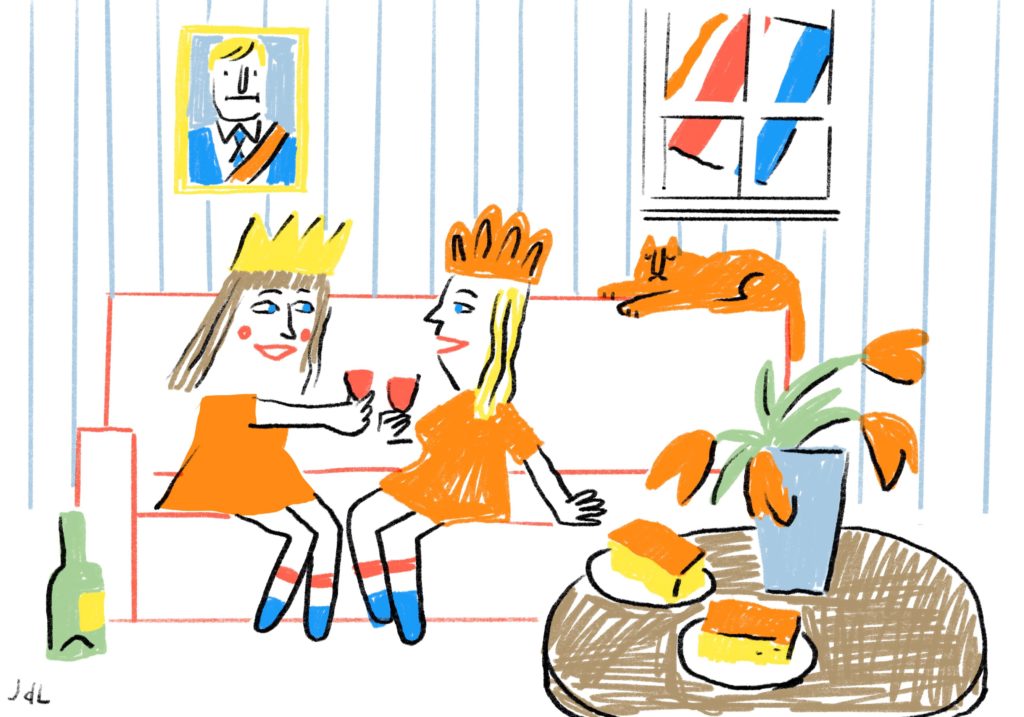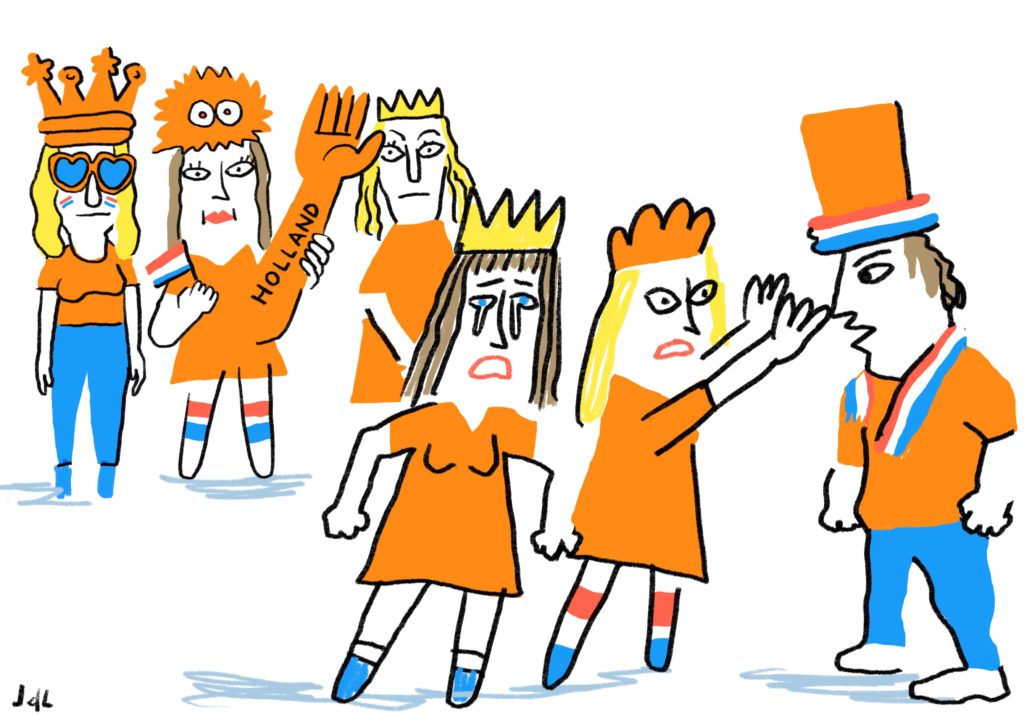A search for my meaning of friendship
Has friendship become an empty and shallow concept? University editor Anne Grefkens thinks so: “By calling each other ‘friend’ all the time, the concept is subject to levelling. The theme of this year’s Month of Philosophy is Intimate Strangers. A appropriate occasion to put her search for the meaning of friendship on paper.

Until recently, I celebrated Kings Night every year with a group of friends in the center of Tilburg. The fun of the annual party always started weeks in advance. New clothes were bought in advance, drinks were bought in time, and the name of the group app was invariably changed to the name of our King. This year I am celebrating Kings Night with other friends. The reason?
My last King’s Night with this group of friends ended in disillusionment. A situation arose where a friend got on the wrong side of a young man, someone who had caused her a lot of grief in the past. Without thinking about it, I stepped into the breach for her. I walked up to the young man and asked him if he had a screw loose. After I had lectured him, I was taken aside by another friend: “Anne, don’t do that! It’s Kings Night, we were supposed to have a good time tonight, right?” Somewhat perplexed, I responded that I thought my loyalty to her was more important than “a fun night,” because we are friends, aren’t we?
There I was, angry and irritated with a beer in my hand amongst the dancing youngsters of Tilburg. Still, this evening has taken a very positive turn. The friend I had stood up for appreciated my attempt to defend her. Together we left the party and once back home, we changed from beer to red wine. It became one of the most fruitful evenings ever. In fact, our King’s Night became a search for the meaning of friendship. “What does friendship mean to you?”, she asked me. “Unconditional loyalty,” I replied. “And to you?”, I asked. “Unconditional loyalty”, she replied.
Loyalty
Without a doubt we agreed: friendship is about loyalty. There is nothing I love more than going through fire and water for each other, even when things are not working out. But I ask myself more and more whether there is still room for such a friendship in today’s society. To what extent does the swipe culture in which everything always has to be “nice” not play tricks on a friendship? I feel that friendships are becoming more and more superficial because of this. For many, friendship should mainly be a “fun experience,” like a day at the Efteling. And if the friendship breaks down? Oh well, then you go through your Instagram “friends list” again. Who wants to go to the museum with me next week?
The Dutch word friend is derived from “vrijen” (to love) and has synonyms in the words comrade, amice (dear friend), and blood relative. The notion of loyalty is thus already contained in the word. A notion that has been lost in recent years because the concept of “friendship” is subject to levelling. Because people call each other “friend” all the time, it has become an empty and shallow concept.
How often do you hear people say variations of the following statements: “I met a girl at a party last week and I immediately felt such a special ‘friendly’ bond with her”, “You need another headset, right? I have a ‘friend’ who deals in phone accessories” and “I’ve invited at least a hundred ‘friends’ to our wedding party.”
Different types of friendships
The Greek philosopher Aristotle (384 – 322 B.C.) would have been glad he was not born in this era. He abhorred so-called polyphilia (many friends) and stated that “someone with many friends, has no friends.” Also philosopher and writer Lammert Kamphuis notes in his book Philosophy for an Inimitable Life (Filosofie voor een weergaloos leven) that a thorough process of unfriending would not be out of place for a modern person.
In his great work Ethica, Aristotle distinguished between three types of friendships. First, he describes friendships that are primarily aimed at mutual benefit. Examples are friendships between colleagues or fellow students. The moment the “usefulness” disappears, the friendship disintegrates. In addition, he typifies a second type of friendship that focuses on the pleasant. These can be people with whom you go out for an evening or to a concert, for example. When there is no longer time or space to engage in these joint activities, the friendship also fizzles out.

Finally, Aristotle defines a third form of friendship that is overwhelmingly superior to the other forms. It is oriented toward the good and is based in particular on the enjoyment of each other’s characters. According to Aristotle, therefore, this third form of friendship can never be mentioned in the same breath as polyphilia. Indeed, a true friendship in which one enjoys each other’s characters is so rare, according to him, that an individual can have but few friendships of this kind.
With this, in my opinion, Aristotle hits the figurative nail on the head. A society that is subject to a swipe culture is weighed down by polyphilia. As a result—for me—the most desirable form of friendship is lost.
Friend
Since that particular King’s Night, I have increasingly been placing my acquaintances in the lists that Aristotle gave his readers. This subdivision has a positive effect on my peace of mind because it frames my expectations within a friendship. I have many friends with whom I like to have a drink, visit the gym, or have a philosophical conversation. I love them all equally and wish them all the best. But their real souls, desires, uncertainties, and dreams are unknown to me.
For me, this does not feel like I am missing something but a logical consequence of the kind of relationship I have with them. I don’t expect them to be there for me day and night and vice versa, I don’t feel compelled to check in with them regularly to see how they’re doing. After all, it is impossible to maintain a deep and intense relationship with all your friends. In recent years, I have noticed that these friends (no matter how nice they are) are interchangeable. They come and go, and without emotions running too deep, we sometimes say goodbye to each other for good. So, in a way, I too have partially fallen prey to the swipe culture.
Partly, because I consider myself fortunate that there are also a number of people in my life whom I can place in Aristotle’s third list. When I speak of them, I rarely refer to them as my “friends.” This is because I deliberately do not want to shortchange them. They are my bosom friends and blood relatives. It feels as if we are cut from the same cloth and, therefore, always understand each other.
The friendship I have built with them has not manifested itself in one year and that makes it enduring. In the words of writer Connie Palmen, the bond between us is so great and symbiotic that letting go would be devastating. The memories, similarities and “enjoying each other’s characters” makes us unconditionally loyal to each other. Aristotle was right, for that is a rare happiness.
Up with Orange, but…
I have come to value quality over quantity and, this year, am celebrating Kings Night with a smaller group of people than before. I would therefore like to conclude with a modest appeal to my fellow human beings. Take a critical look at your group of friends. Who really goes through fire and water for you? Who can you call day and night, and who actually shows up? Who stands up for you in a quarrel and prefers your peace of mind above a “pleasant King’s Night”?
In short, who is unconditionally loyal? Those are the people who belong in your third list because they work for you. You can go the extra mile for them. Their characters make red wine taste just that little bit better than a beer at an annual party. Up with Orange, but a bosom friendship above all.
Translated by Language Center, Riet Bettonviel






